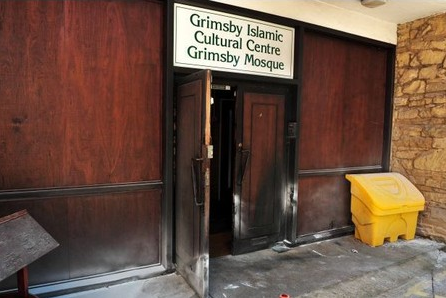 Two former soldiers who fire-bombed a mosque in response to the murder of soldier Lee Rigby were caught on CCTV preparing petrol bombs and throwing them at the building, a jury has heard.
Two former soldiers who fire-bombed a mosque in response to the murder of soldier Lee Rigby were caught on CCTV preparing petrol bombs and throwing them at the building, a jury has heard.
Grimsby Crown Court was shown footage of Stuart Harness, 33, and Gavin Humphries, 37, each carrying two home-made petrol bombs from Harness’s home in the town. More cameras caught them later, launching the bombs at the doors of the Grimsby Islamic Cultural Centre, four days after Fusilier Rigby was killed outside Woolwich Barracks, in London, in May.
A jury of eight women and four men heard how a number of worshippers were inside the mosque when the attack took place on May 26. They managed to extinguish the fire and Harness and Humphries were soon arrested as they were witnessed attacking the building by passing police community support officers, the court was told. Both men have pleaded guilty to the arson attack, the jury heard.
Excerpts of CCTV footage from the mosque and Harness’s home on Dixon Avenue were shown to the jury on the first day of the trial of a third man, Daniel Cressey, 24, of New Holland, North Lincolnshire. Cressey, who is Harness’s cousin, is accused of driving the two other men to the mosque. He denies one charge of aiding and abetting arson, being reckless as the whether life was endangered.
Before the case started, Judge Mark Bury explained to the jury how the case related to an arson attack on a mosque that was an alleged reprisal for the murder of Fusilier Rigby on May 22.
He excused members of the jury panel with close connections to the Grimsby Islamic Cultural Centre from serving.
Prosecutor Jeremy Evans told the court how worshippers inside the mosque that evening heard a fire alarm going off and spotted flames coming from the outside of the front door of the building. Mr Evans said those inside immediately took steps to put the fire out and it was extinguished.
He said two police community support officers patrolling outside spotted what Harness and Humphries were up to and chased them back to Harness’s home, where the pair were detained.
Mr Evans told the jury how CCTV footage was recovered from outside the house in Dixon Avenue, some of which was shown in court today. The prosecutor said the silent footage showed the petrol bombs being made in the yard.
In one section, shown to the jury, Cressey is seen arriving at the house as a metal table is on fire. Mr Evans told the jury the other men had set light to split petrol to burn it off.
He showed the jury various clips of Cressey at the house and told the jury it was not conceivable that he did not know what they were doing or what they were planning.
Later footage shown in court showed Harness and Humphries carrying the petrol bombs out of the house – one in each hand in front of them. Mr Evans said the prosecution case is that they then got into Cressey’s car to drive the short distance to the mosque.
The prosecutor told the court that Cressey admits going to the house but is expected to deny that he knew what they were planning despite being in his cousin’s home for 40 minutes before they all left. He said Cressey is also expected to deny seeing any petrol bombs at the house.
Mr Evans showed the jury more CCTV footage, this time of Harness and Humphries at the mosque. One clip clearly shows four petrol bombs flying through the air before exploding in bright orange flashes at the door of the building.
Returning to Cressey’s alleged role, the prosecutor said: “This was a team effort, members of the jury.” He said: “He could not have missed the fact that there were home made petrol bombs being constructed or had been constructed in the property.”
Cressey sat in dock with a security officer, wearing a dark suit, grey tie and white shirt.
The trial, which is expected to last about three days, was adjourned until tomorrow.
